Ashwagandha and Co-Dependency: Supporting Stress Resilience
Introduction
When you live with co-dependency, your body rarely rests. You might appear calm on the outside—always composed, helpful, or agreeable—but inside, your nervous system is running on overdrive. Every sigh from someone you love, every unanswered text, every conflict or silence can trigger the same fight-or-flight reaction that a physical threat would.
Over time, this chronic vigilance drains not only your emotional energy but your physical vitality. The constant stress response can lead to hormonal imbalance, insomnia, burnout, and what many describe as emotional exhaustion or “nervous system fatigue.”
This is where Ashwagandha, one of the most researched adaptogenic herbs, can make a powerful difference. Known as “the strength of the stallion” in Ayurveda, Ashwagandha (Withania somnifera) helps your body adapt to stress, regulate cortisol levels, and restore inner equilibrium. For people healing from co-dependency, it offers both biochemical and emotional resilience—the ability to stay grounded even when relationships feel uncertain. 🌸
Let’s explore how co-dependency affects your stress chemistry and how Ashwagandha supports recovery on both physical and emotional levels.
Looking for supplements for This? Click here.
The Hidden Stress of Co-Dependency 💔

Co-dependency isn’t simply caring too much—it’s caring at the cost of your own well-being. It’s an emotional survival pattern where safety feels tied to someone else’s happiness.
When love and approval are unpredictable, the nervous system learns that connection equals tension. You start monitoring others’ moods, anticipating conflict, and trying to fix problems before they arise. This hypervigilant empathy keeps your stress hormones—especially cortisol—consistently elevated.
Over time, the body begins to wear down. Cortisol no longer rises and falls in healthy rhythms; instead, it stays stuck in overdrive or crashes completely. You may notice:
😴 constant fatigue despite sleep
💭 difficulty focusing or remembering
💓 heart palpitations or shallow breathing
😣 irritability or anxiety for no clear reason
🌙 sleepless nights followed by groggy mornings
This is what scientists call HPA axis dysregulation—a state where your body’s stress system loses its balance. For those with co-dependent tendencies, this imbalance often feels like living in emotional “high alert.”
Ashwagandha helps by retraining the body to return to calm more easily, restoring the chemical foundation of safety that co-dependency erodes. 🌿
The Science of Ashwagandha 🌱
Ashwagandha is a powerful adaptogen, meaning it helps the body adapt to physical, emotional, and psychological stress. It doesn’t push you in one direction (like caffeine or sedatives); instead, it gently brings your system back to equilibrium.
Research shows that Ashwagandha:
🧠 lowers cortisol levels by up to 30% in chronically stressed individuals
💤 improves sleep quality and reduces nighttime anxiety
💪 enhances energy, endurance, and motivation
🫀 balances thyroid hormones and blood sugar
💫 supports serotonin and GABA activity—key neurotransmitters for calm
These effects make Ashwagandha uniquely suited for people struggling with co-dependency and emotional burnout. It targets the root cause of emotional exhaustion: an overactive stress system.
The Cortisol Connection: Healing the Stress Loop ⚡
Cortisol, the body’s primary stress hormone, is meant to rise briefly when you need to react—like slamming on the brakes to avoid an accident. But in co-dependency, cortisol remains chronically elevated because emotional danger never feels resolved.
Your brain interprets uncertainty in relationships as a threat to survival. That ongoing alarm keeps cortisol flowing day and night, disrupting sleep, digestion, and hormonal balance.
Ashwagandha helps normalize cortisol rhythms. It doesn’t suppress it completely—it teaches the body to respond rather than react. Over several weeks, people often report feeling calmer during emotional triggers, more energetic in the morning, and more peaceful at night.
Think of it as turning down the volume on your stress response so you can finally hear your own thoughts again. 🌿💫
Ashwagandha and Emotional Boundaries 🧘
Co-dependent individuals often have porous boundaries because their nervous systems are attuned to others’ emotions. You might “feel” someone’s disappointment or tension as if it’s your own, which keeps you anxious and drained.
By lowering stress reactivity and improving emotional regulation, Ashwagandha can help you separate empathy from enmeshment. When your cortisol and adrenaline stabilize, you stop absorbing others’ emotions so intensely. You can care without collapsing.
This biochemical grounding makes boundary-setting easier—not because you suddenly stop caring, but because your body no longer equates others’ discomfort with danger.
Looking for supplements for This? Click here.
Supporting the Nervous System Through Balance 🌸
Ashwagandha also influences two important neurotransmitters involved in anxiety and co-dependency: GABA and serotonin.
GABA acts as the brain’s “brake pedal,” helping you slow down and relax after stress. When it’s low, thoughts race, and you feel stuck in worry loops. Serotonin, on the other hand, helps regulate mood, confidence, and self-worth. Low serotonin often manifests as insecurity or overthinking—common features of co-dependency.
Ashwagandha gently increases both, helping you feel calm yet alert, emotionally steady yet compassionate. The result is a nervous system that can finally rest.
Replenishing What Stress Depletes 💧
Chronic stress depletes essential nutrients like magnesium, zinc, and B vitamins—key cofactors for neurotransmitter and hormone production. When combined with Ashwagandha, these nutrients amplify its effects.
✨ Magnesium calms the nervous system and improves sleep
✨ B-complex vitamins restore energy and focus
✨ Vitamin C supports adrenal gland recovery
Together, they help rebuild the foundation that chronic emotional labor has eroded.
How Ashwagandha Affects the Adrenals 💪
The adrenal glands—tiny organs that sit above your kidneys—are your body’s stress regulators. In co-dependency, they’re often overworked from years of emotional vigilance.
Ashwagandha supports adrenal recovery by modulating the HPA axis (the brain-adrenal connection). It improves your ability to recover from stress rather than stay stuck in it. Over time, this leads to steadier energy, improved concentration, and fewer emotional crashes.
You might notice that the familiar afternoon slump or “Sunday sadness” feels lighter. That’s your stress system resetting. 🌤️
Emotional Healing and the Role of Calm Chemistry 💫
Emotional growth requires safety—and safety starts in the body. When your brain’s alarm system is constantly firing, therapy and self-awareness can only go so far.
Ashwagandha provides the biochemical safety net that allows deeper emotional healing to take root. When your body is calm, you can process feelings without overwhelm. You can pause before reacting. You can stay grounded when others are upset.
This is where true recovery from co-dependency begins—not in endless self-sacrifice or analysis, but in a regulated nervous system that knows peace.
What to Expect When You Start 🌿
Ashwagandha works gradually but profoundly. Most people notice small shifts within one to two weeks:
🌙 better sleep quality
💗 reduced anxiety or racing thoughts
⚡ more balanced energy throughout the day
🧘 improved emotional stability
By the four-to-six-week mark, many describe a renewed sense of inner steadiness. Conflicts feel less triggering, and the urge to fix or control begins to fade.
Because Ashwagandha restores rather than stimulates, it’s safe for long-term use in most people. However, it’s best to consult your healthcare provider if you’re taking thyroid medication, antidepressants, or have autoimmune conditions.
The Spiritual Side of Resilience 🌞
In Ayurvedic tradition, Ashwagandha is more than an herb—it’s a symbol of inner strength. It teaches the body to bend without breaking, to adapt without losing essence.
When you take Ashwagandha consistently, you’re not just calming stress hormones—you’re retraining your spirit to stay anchored in self-trust. You stop defining peace by how others behave and start finding it within your own chemistry.
The goal isn’t to detach from love but to experience it from a place of wholeness.
Pairing Ashwagandha With Lifestyle Practices 🌼
Supplements are powerful, but they work best alongside daily habits that nourish the nervous system.
🌿 Grounding breathwork: Slow, rhythmic breathing lowers cortisol and signals safety to your brain. Try inhaling for 4 counts, exhaling for 6.
Want to try Breathwork? Click Here.
☀️ Morning sunlight: Natural light resets your circadian rhythm, improving both cortisol and serotonin balance.
💧 Hydration and minerals: Chronic stress dehydrates the body—replenish electrolytes to maintain adrenal function.
🍲 Stable meals: Eat regularly to prevent blood sugar drops that mimic anxiety symptoms.
🧘 Gentle movement: Yoga, walking, or stretching release trapped tension without spiking adrenaline.
When combined with Ashwagandha, these habits create a synergistic effect—healing not just the chemistry, but the rhythm of your entire life.
The Journey Back to Yourself 🌺
Healing from co-dependency isn’t about caring less; it’s about caring with balance. It’s about giving from fullness rather than depletion.
Ashwagandha supports this transformation by helping your body remember safety, your mind rediscover focus, and your heart reclaim its natural rhythm. As your stress resilience grows, you begin to feel what peace actually feels like—not numbness, but quiet strength.
Over time, your relationships shift too. You stop overfunctioning. You start communicating instead of controlling. You begin to trust that love can exist without self-erasure.
And that’s the real power of Ashwagandha—not just in calming stress, but in helping you reconnect with your grounded, resilient self. 🌿💛
Looking for online therapy ? Click Here.
References 📚
Chandrasekhar, K., Kapoor, J., & Anishetty, S. (2012). A prospective, randomized double-blind, placebo-controlled study of safety and efficacy of high-concentration full-spectrum Ashwagandha root extract in reducing stress and anxiety in adults. Indian Journal of Psychological Medicine.
Panossian, A., & Wikman, G. (2010). Effects of adaptogens on the central nervous system and the molecular mechanisms associated with their stress-protective activity. Pharmaceuticals.
Lopresti, A. L., Smith, S. J., & Drummond, P. D. (2019). A randomized, double-blind, placebo-controlled, crossover study examining the hormonal and vitality effects of Ashwagandha (Withania somnifera). Journal of the International Society of Sports Nutrition.
Porges, S. W. (2011). The Polyvagal Theory: Neurophysiological Foundations of Emotions, Attachment, Communication, and Self-Regulation.
van der Kolk, B. A. (2014). The Body Keeps the Score: Brain, Mind, and Body in the Healing of Trauma.
Related Posts
-
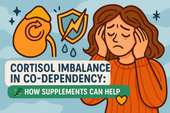
Cortisol Imbalance in Co-Dependency: How Supplements Can Help
Cortisol is the body’s main stress hormone—essential for energy and focus, yet harmful when chronically elevated. When life feels like constant pressure, cortisol imbalance can trigger fatigue, anxiety, and mood swings. Learning how to restore balance through rest, nutrition, and the right supplements can help you rebuild calm, clarity, and resilience from the inside out. 🌿💫
-
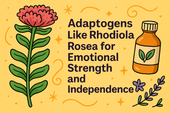
Adaptogens Like Rhodiola Rosea for Emotional Strength and Independence
Adaptogens are nature’s stress-balancing herbs—plants like Rhodiola, Ashwagandha, and Holy Basil that help your body adapt to emotional and physical pressure. They don’t numb or overstimulate; they teach your system how to find calm and stability again. By restoring balance to your hormones, energy, and mood, adaptogens nurture emotional resilience and grounded strength. 🌿✨
-
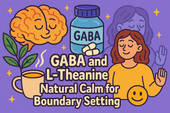
GABA and L-Theanine: Natural Calm for Boundary Setting
Anxiety can feel like a storm inside your mind—constant tension, overthinking, and the inability to relax even when you’re safe. But beneath the chaos, your body is simply trying to protect you. Learning to calm anxiety starts with understanding how your brain and nervous system respond to stress—and how to gently guide them back to peace. 🌿💫
-
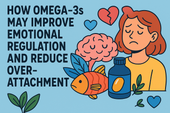
How Omega-3s May Improve Emotional Regulation and Reduce Over-Attachment
Inflammation isn’t just about sore joints or fatigue—it’s also a hidden driver of mood swings, anxiety, and emotional burnout. When chronic stress or poor diet keep the body inflamed, the brain’s chemistry changes, making calm harder to access. Learning how to reduce inflammation through nutrition, rest, and mindful living helps restore balance from the inside out. 🌿💫
-
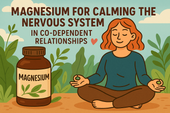
Magnesium for Calming the Nervous System in Co-Dependent Relationships
The nervous system is the body’s communication network, linking your mind and organs through a delicate web of electrical signals. It controls everything from emotional responses to muscle movement—and when it’s overwhelmed by chronic stress or anxiety, balance is lost. Learning how to calm and nourish your nervous system through nutrition, mindfulness, and rest can restore peace and emotional stability. 🌿💫
-

Why Co-Dependency Feels Draining: Adrenal Fatigue and Supplements That Help
The adrenal glands are small but powerful organs that sit above your kidneys, acting as your body’s built-in stress managers. They produce hormones like cortisol and adrenaline that help regulate energy, mood, and resilience. When they’re overworked from chronic stress or emotional exhaustion, fatigue and imbalance follow. Supporting adrenal health naturally can help restore calm, energy, and hormonal balance. 🌿⚡
-

The Link Between Anxiety, Co-Dependency, and Natural Support
Anxiety feels like living in constant alert mode—your heart races, your thoughts loop, and your body can’t find peace. It’s the nervous system’s way of preparing for danger, even when none exists. Understanding what’s happening in your mind and body is the first step toward calming the storm and restoring balance. 🌿💫
-

Supplements That Support Dopamine and Serotonin in Co-Dependent Patterns
Serotonin is the neurotransmitter of calm, confidence, and contentment. When it’s balanced, you feel peaceful and emotionally grounded. When it’s low, anxiety, mood swings, and emotional dependence take over. By understanding serotonin’s role in emotional health—and how to support it naturally—you can rebuild inner stability, improve relationships, and cultivate lasting happiness from within. 🌞💫
-

How Emotional Exhaustion in Codependency Impacts the Nervous System
The nervous system is the body’s communication network, connecting the brain to every organ and muscle. It regulates stress, mood, and emotion through a delicate balance of electrical and chemical signals. When overwhelmed, it can become dysregulated—leading to fatigue, anxiety, and emotional imbalance. Understanding how to calm and strengthen the nervous system is key to healing from chronic stress and emotional burnout. ⚡🌿
-

What Is Co-Dependency? The Role of Brain Chemistry and Stress
Stress is more than a feeling—it’s a full-body experience that begins in the brain and ripples through every cell. When cortisol surges and the nervous system stays on alert, your body can’t rest or recover. Over time, this constant tension affects energy, focus, mood, and even immune health. Understanding stress chemistry is the first step toward breaking free from burnout and finding calm again. 🌿
-

Creating a Supplement Stack for Motivation, Energy, and Anti-Procrastination
Motivation is the fuel behind every meaningful achievement—but it’s not just about willpower. It’s a mix of mindset, brain chemistry, and momentum. When energy, focus, and purpose align, action feels natural instead of forced. Learn how to harness motivation as a daily state, not a fleeting feeling.
-

Supplements for Building Consistency and Reducing Chronic Procrastination
Biochemistry is the bridge between biology and chemistry—the science of life at the molecular level. It explains how nutrients, hormones, and neurotransmitters interact to create energy, thought, and emotion. From brain function to muscle movement, biochemistry reveals the invisible processes that sustain health, balance, and vitality.
-

GABA and Procrastination: Supporting Calm Focus for Productivity
GABA is the brain’s natural calming messenger—a neurotransmitter that helps slow mental overactivity and ease stress. When GABA levels drop, focus fades, anxiety rises, and procrastination becomes more likely. By supporting GABA through nutrition, lifestyle, and supplements, you can restore calm clarity, improve focus, and take action with steady, balanced energy.
-

Ashwagandha and Procrastination: Lowering Stress to Improve Action
Science is the language of curiosity and discovery. It helps us understand the hidden patterns behind life, energy, and the universe. Through experimentation and critical thinking, science connects imagination to evidence—turning questions into knowledge. Whether through microscopes, molecules, or minds at work, science represents our endless pursuit of truth and innovation.
-

Neurotransmitters and Motivation: Supplements That Support Drive and Focus
Supplements can do more than boost physical health—they can also enhance mental clarity, focus, and motivation. Nutrients like omega-3s, magnesium, B vitamins, and adaptogens help balance neurotransmitters, stabilize mood, and support brain energy. When combined with good sleep, nutrition, and mindful habits, they can transform how your brain performs under stress.
-

How Stress Hormones Like Cortisol Fuel Procrastination (and What Helps)
Blood sugar isn’t just about physical health—it directly impacts focus, mood, and motivation. When glucose levels spike and crash, energy and attention do the same, fueling procrastination and brain fog. Learning how to stabilize blood sugar through balanced meals, mindful habits, and key nutrients helps keep your mind steady, focused, and ready to act.
-

Brain Fog and Procrastination: Supplements for Mental Clarity
Brain fog can turn even simple tasks into mental hurdles. When your thoughts feel slow and unclear, procrastination often follows—making focus and productivity seem impossible. This article explores the biochemical and lifestyle causes of brain fog and reveals the most effective supplements for restoring mental clarity, focus, and sustained energy.
-

The Link Between Low Energy and Procrastination: Can Supplements Help?
Neurochemistry shapes how we think, feel, and act. When neurotransmitters like dopamine, serotonin, and GABA fall out of balance, it can lead to fatigue, anxiety, or lack of motivation—fueling procrastination and low mood. Understanding the brain’s chemical communication system helps us find ways to restore focus, calm, and emotional stability through nutrition, mindfulness, and targeted supplements.
-

Why Do We Procrastinate? The Role of Dopamine and Supplements That Support It
Dopamine is the brain’s motivation messenger—the chemical that fuels focus, reward, and drive. When dopamine levels drop, even simple tasks can feel impossible to start. This article explores how dopamine shapes procrastination, motivation, and mental energy, along with natural supplements and daily habits that help restore balance and get things done.
-

Phosphatidylserine and Stress Reduction for People with BDD
Stress is more than a mental state—it’s a full-body experience that affects hormones, brain chemistry, and emotional balance. For people with Body Dysmorphic Disorder (BDD), constant tension and worry about appearance can overload the nervous system. Learning how stress works and finding ways to calm it is key to breaking the cycle of anxiety and self-criticism.
-

How Antioxidants Like Vitamin C & E Support Mental Health in BDD
Antioxidants are the body’s natural defense against stress and inflammation. For people with Body Dysmorphic Disorder (BDD), oxidative stress can worsen fatigue, anxiety, and emotional imbalance. Nutrients like Vitamin C and E help protect brain cells, boost neurotransmitter function, and support a calmer, clearer mindset—building a stronger foundation for recovery.
-

Ginkgo Biloba and Memory Support for BDD Recovery
Emotional regulation is the foundation of healing from Body Dysmorphic Disorder (BDD). When the nervous system stays in constant overdrive, even small stressors can trigger self-critical spirals. Learning to calm emotional reactivity helps restore clarity, confidence, and a sense of inner balance. By blending mindfulness, nervous system support, and self-compassion, you can retrain your brain to respond—not react—to emotion.
-

Alpha GPC and Cognitive Function in Body Dysmorphic Disorder
Mental fatigue can feel like your brain has hit a wall—thoughts slow down, focus fades, and motivation disappears. For people with Body Dysmorphic Disorder (BDD), chronic overthinking, emotional stress, and constant self-evaluation can deplete mental energy even further. Understanding what causes this cognitive exhaustion is the first step toward recovery—through rest, balanced nutrition, and targeted brain-supporting supplements.
-

N-Acetyl L-Tyrosine and BDD: Supporting Mental Clarity
Chronic stress doesn’t just affect your mood—it reshapes your brain chemistry, weakens focus, and fuels the obsessive thought loops common in Body Dysmorphic Disorder (BDD). Over time, constant cortisol elevation drains mental energy and emotional balance. Learning to recognize and manage chronic stress is essential to restoring mental clarity, self-compassion, and resilience.
-

Chamomile and Lavender for Calming Obsessive Body Image Thoughts
The nervous system is the command center of our emotional and physical world—and in Body Dysmorphic Disorder (BDD), it often operates in overdrive. Understanding how the brain and body communicate under stress reveals why intrusive thoughts feel uncontrollable. Learning to regulate the nervous system through calm practices, nutrition, and supplements helps restore inner balance and emotional safety.
-

Adaptogens for Body Dysmorphic Disorder: Rhodiola, Ginseng, and More
Rhodiola rosea, often called the “golden root,” is an adaptogenic herb renowned for boosting stress resilience and mental endurance. For individuals with Body Dysmorphic Disorder (BDD), Rhodiola may help reduce fatigue, regulate cortisol, and enhance emotional balance. By supporting both mind and body, this powerful plant promotes calm focus, improved mood, and renewed energy to face daily challenges.
-

B Vitamins for Stress Resilience in BDD: Rebuilding Calm from Within
Biochemistry is at the heart of every thought, emotion, and reaction we experience. In Body Dysmorphic Disorder (BDD), chemical imbalances in neurotransmitters like serotonin, dopamine, and GABA can amplify stress and distort self-perception. Understanding the biochemistry behind mood and stress regulation offers a path toward healing—bridging the gap between emotional experience and the body’s molecular balance.
-

Melatonin and Body Dysmorphic Disorder: Restoring Healthy Sleep Patterns
Melatonin, the body’s natural sleep hormone, plays a vital role in helping people with Body Dysmorphic Disorder (BDD) restore healthy sleep cycles. When anxiety and obsessive thinking interfere with rest, melatonin levels often drop, leading to more emotional reactivity and distorted self-perception. This article explores how melatonin works, why BDD disrupts it, and how natural supplementation—combined with mindful routines—can help the brain and body finally find calm at night.
-

Sleep Struggles with BDD: Supplements for Rest and Recovery
When you’re living with Body Dysmorphic Disorder (BDD), restful sleep can feel impossible—but the right supplements can help reset your body’s natural rhythm. From magnesium and L-theanine to 5-HTP and ashwagandha, these nutrients support relaxation, lower cortisol, and enhance melatonin production. This article explores how supplements can calm the mind, ease nighttime anxiety, and promote true restorative sleep for emotional and physical recovery.
-

5-HTP and Serotonin Balance: Could It Help with Body Dysmorphic Disorder?
Anxiety can feel like a storm inside the mind—restless, overwhelming, and hard to control. In people with Body Dysmorphic Disorder (BDD), anxiety often fuels obsessive thoughts and self-criticism, creating a painful cycle of worry and self-doubt. This article explores the biological roots of anxiety, the role of neurotransmitters like serotonin and GABA, and how natural strategies such as mindfulness, supplements, and nervous system regulation can restore calm and mental clarity.
-

Can Ashwagandha Help Ease Stress and Anxiety in Body Dysmorphic Disorder?
Neurotransmitters like serotonin, dopamine, GABA, and acetylcholine are the chemical messengers that shape how we think, feel, and react to stress. In Body Dysmorphic Disorder (BDD), imbalances in these neurotransmitters can amplify anxiety, obsessive thinking, and emotional distress. This article explores how restoring healthy brain chemistry through nutrition, supplements, and mindfulness can help bring clarity, calm, and emotional stability.
-

L-Theanine for BDD: Finding Calm in the Mind
Neurochemistry plays a central role in how we think, feel, and see ourselves. For those living with Body Dysmorphic Disorder (BDD), imbalances in neurotransmitters like serotonin, dopamine, and GABA can intensify anxiety, obsessive thoughts, and emotional distress. This article explores how regulating brain chemistry through supplements, mindfulness, and lifestyle changes can bring the nervous system back into harmony and restore inner calm.
-

Omega-3 Fatty Acids and Body Image Disorders: Supporting Emotional Health
Omega-3 fatty acids do far more than support heart health—they nourish the brain, stabilize mood, and may ease the emotional turbulence tied to body image disorders like BDD. This in-depth article explores how omega-3s regulate serotonin, dopamine, and inflammation, helping individuals reduce obsessive thoughts and rebuild self-acceptance. It also connects nutrition to therapy, mindfulness, and nervous system balance for holistic emotional healing.
-

Magnesium and BDD: Calming an Overactive Nervous System
Magnesium plays a crucial role in calming an overactive nervous system—something people with Body Dysmorphic Disorder (BDD) struggle with daily. This article explores how magnesium supports relaxation, emotional regulation, and stress reduction while diving into the science behind its connection to brain chemistry. It also examines how combining magnesium supplementation with therapy and breathwork can help rebalance the body’s stress response, reduce obsessive thought patterns, and promote lasting nervous system calm.
-

The Gut-Brain Axis and BDD: Why Probiotics Might Matter
The gut and brain are constantly in conversation — and that dialogue may shape how you experience Body Dysmorphic Disorder. By nurturing your microbiome with probiotics, prebiotics, and gut-healing nutrients, you can help rebalance serotonin, calm anxiety, and restore emotional stability from within 🧠🦠.
-
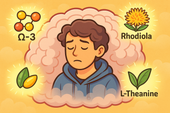
Brain Fog and Body Dysmorphic Disorder: Can Nootropic Supplements Help?
Brain fog often accompanies Body Dysmorphic Disorder, clouding focus and deepening emotional fatigue. Nootropic supplements like L-theanine, Rhodiola, and CoQ10 can help restore mental clarity, balance neurotransmitters, and bring calm energy back to the mind 🌿🧠.
-

How Stress Hormones Like Cortisol May Worsen Body Dysmorphic Disorder
Chronic stress floods the brain with cortisol — the hormone that keeps you on high alert. In Body Dysmorphic Disorder, this chemical overdrive fuels anxiety, distorts self-image, and traps the body in survival mode. Calming cortisol helps restore both peace and perspective 🌿🧠.
-

The Role of Neurotransmitters in BDD—and How Supplements May Help
Neurotransmitters like serotonin, dopamine, glutamate, and GABA shape how people with Body Dysmorphic Disorder perceive themselves. When these brain messengers fall out of balance, perception distorts — but targeted supplements can help restore calm, focus, and emotional regulation 🧠🌿.
-

What Is Body Dysmorphic Disorder? A Deeper Look at the Mind-Body Connection
Body Dysmorphic Disorder (BDD) isn’t just about appearance — it’s about perception. When brain chemistry, trauma, and stress distort self-image, the mind begins to see flaws that aren’t truly there. Healing starts by calming the nervous system and reconnecting mind and body 🪞🧠.
-
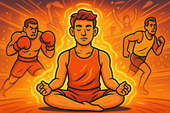
Keeping Calm in Competitive Sports: How to Train Your Mind, Body, and Chemistry for Peak Performance
Competitive pressure can overwhelm even the strongest athletes — but calm is trainable. By combining supplements like magnesium, L-theanine, and adaptogens with breathwork and mindset training, you can stay focused, balanced, and in control under any level of stress 🧠🏅.
-
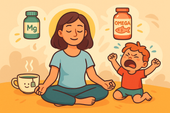
Supplements for Parents Facing Toddler Tantrums: Staying Calm When Little Emotions Run Wild
Toddler tantrums can drain even the most loving parent — but your calm is powerful. With the right supplements like magnesium, L-theanine, and ashwagandha supporting your nervous system, you can stay patient, grounded, and kind, even when emotions run high 🧸🌿.
-

Workplace Stress and Anger Management Support
Workplace stress can quickly turn into frustration — but calm is a skill you can train. By combining supplements like magnesium, L-theanine, and adaptogens with breathwork and mindset tools, you can stay focused, patient, and emotionally grounded no matter how intense the office gets 💼🌿.
-

How to Stay Patient With Family During Stressful Holidays
Holiday gatherings can stir up old stress and test your patience — but calm is possible. With nervous system support from magnesium, L-theanine, and adaptogens, plus mindful breathing and clear boundaries, you can stay centered, kind, and grounded even when family chaos unfolds 🎄💞.
-

Supplements to Keep Calm During Traffic Jams
Getting stuck in traffic doesn’t have to ruin your mood. With calming supplements like magnesium, L-theanine, and ashwagandha, you can train your body to stay relaxed and focused behind the wheel — turning gridlock into a moment of grounded patience 🚗🌿.
-
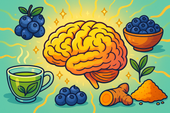
The Role of Antioxidants in Healing Brain Stress from Dissociation
Antioxidants protect the brain from the oxidative stress caused by trauma and dissociation. By neutralizing free radicals and supporting mitochondrial recovery, they help restore clarity, focus, and emotional balance — allowing the mind to heal at the cellular level 🌿🧠.
-
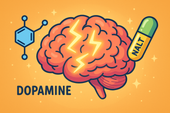
N-Acetyl L-Tyrosine (NALT) for Supporting Mental Clarity
N-Acetyl L-Tyrosine (NALT) fuels dopamine production — the neurotransmitter of focus and motivation. By supporting brain chemistry during stress, NALT helps restore mental clarity, energy, and alertness, making it easier to think clearly and feel present again ⚡🧠.
-

How Ginseng May Improve Focus and Energy in Dissociation
Ginseng helps combat the mental fatigue and fog that often come with dissociation. By supporting mitochondrial energy, balancing neurotransmitters, and regulating cortisol, it gently restores focus, motivation, and emotional presence — helping the mind reconnect with clarity and strength 🌿⚡.
-
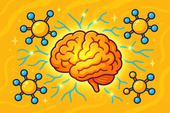
Phosphatidylserine and Dissociation: Supporting Cognitive Function
Phosphatidylserine helps calm the stress response by balancing cortisol, the body’s primary stress hormone. By lowering cortisol spikes, it protects memory, focus, and emotional stability — restoring clarity and mental presence for those struggling with dissociation 🧠🌿.
-
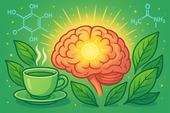
Can Green Tea Extract Help with Dissociative Brain Fog?
Green tea extract may help lift dissociative brain fog by supporting neurotransmitter balance, reducing inflammation, and enhancing energy at the cellular level. With its key compounds EGCG and L-theanine, it promotes calm focus, clarity, and emotional presence — helping you feel more alert and grounded 🍵🧠.

















































